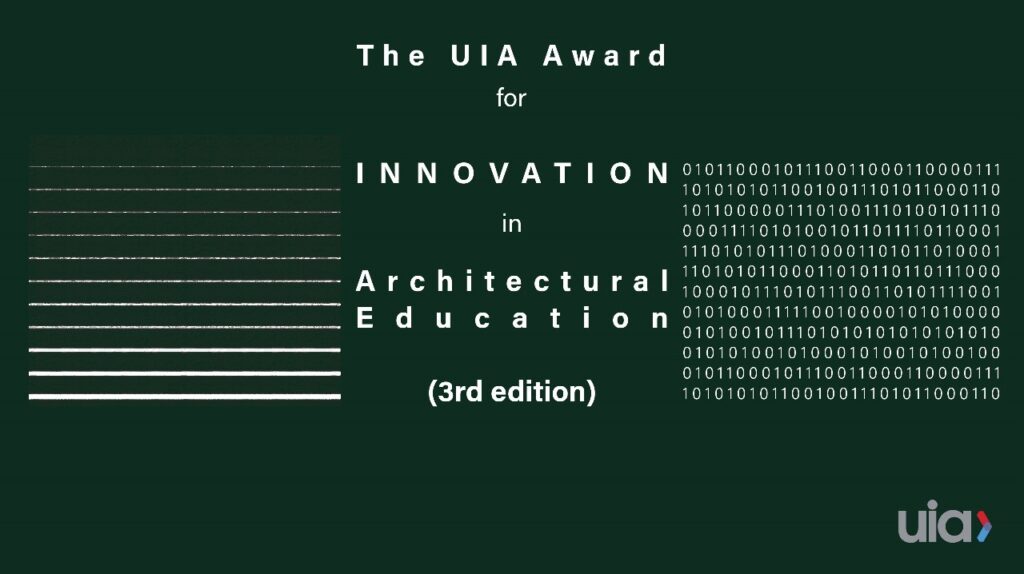Key dates
Prizes
Up to (5) awards will be conferred. This includes one (1) certificate for one school/programme located within each of the 5 UIA Regions. The jury reserves the right not to award all the prizes if the entries fall short of the required standards. Announcement of an additional list of finalist commended entries for their distinctive qualities and merits is at the discretion of the jury.
Theme and objectives
Open to colleges, schools, departments, or programmes of architecture worldwide, the third edition of the UIA Award for Innovation in Architectural Education will recognise excellence in architectural and urban design education, focusing on innovative pedagogies that foster contributions to realising the United Nations Sustainable Development Goals across the five UIA regions, while reflecting their broad diversity. Aligning with the UNESCO-UIA Charter for Architectural Education (updated July 2023), the Award emphasises the role of architecture education in addressing the societal and environmental challenges facing the built environment, and in articulating the opportunities those challenges create.
This edition recognises the multitude of factors influencing the development of sustainable environments, which include focus areas ranging from climate action to health; from inclusivity and migration to community development; and from resource efficiency to heritage conservation.
Key criteria
Architectural education in the 21st century demands creativity and innovation; research and investigation; collaboration and civic engagement; environmental awareness and technical competence. Submissions for this edition of the award must therefore demonstrate:
- Excellence in Pedagogical Practice based on evidence of pedagogical innovation and enhanced learning outcomes;
- Excellence in Addressing Sustainable Development Goals based on evidence of innovation in content and teaching delivery, identifying challenges, and development of solutions.
In demonstrating excellence, entries should consider evidencing and documenting how the pedagogical programme addresses and delivers across the following areas:
- Innovative Pedagogy: by adopting and implementing pedagogical approaches that respond to current global debates in areas that may include health, heritage, digital tools, collaboration, trans disciplinarity, specific user group (children, youth, elderly), community and civic engagement, or a combination of one or more such areas.
- Impactful Inquiry: by demonstrating students’ inquisitiveness in ways that inspire a commitment to addressing social and environmental challenges.
- Inclusive Learning: by discerning and effectively enhancing the diversity of student learning needs, thus offering multiple learning opportunities.
- Research-Driven Design Education: by integrating findings from architectural research, scholarship, and professional practice in ways that add value to the learning environment.
- Interdisciplinary Engagement: by engaging with and potentially contributing to the established body of knowledge through working effectively across disciplines.
- Contextual Responsiveness: by articulating strategic and operational priorities of the context or region in which the school/programme operates.
Eligibility
The Award addresses university-level professional education in architecture which could be any recognized study programme for professional architectural education This includes university-level independent schools/programmes or schools/programmes within public or private universities.
- The school/programme must have been established for at least ten years.
- The school/programme must offer a professional degree in architecture, which is recognized by its local higher education authorities and/or local validation/accreditation body.
UNESCO-UIA validation is not a requirement for entry.
The Award Management Team (award manager and technical committee) will examine the submissions considering eligibility criteria before presenting them for review and assessment by the International Jury Panel. Entries not meeting the eligibility criteria will be disqualified.
Jury Members
- Jana Revedin, Advisor, UIA Architectural Education Commission (Germany) – UIA Representative
- James B. Brown (Sweden)
- Karine Dupre (USA)
- Lindy Osborne Burton (Australia)
- Jolanda Morkel (South Africa)
The Chair of the jury will be elected in the first panel meeting.
Alternate Juror:
Andrii Markovskyi, Member, UIA Architectural Education Commission (Ukraine) – R2 (UIA Representative)
Management Team (non-voting)
Ashraf M. Salama, Co-director, UIA Architectural Education Commission (United Kingdom/Egypt) – Award manager and Curator
Technical Committee members
- Selma Harrington, Co-director, UIA Architectural Education Commission (Ireland)
- Kevin Bingham (South Africa)
- Kaname Yanagisawa (Japan)
